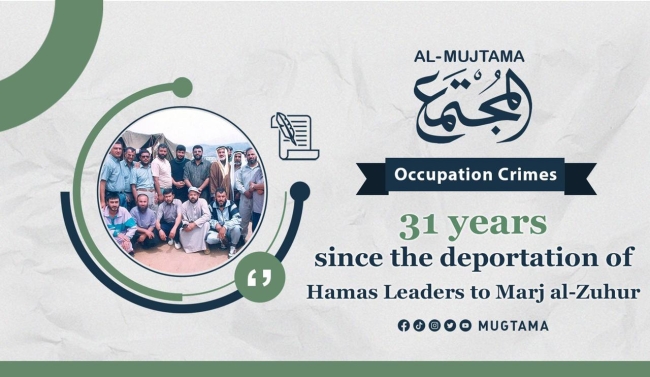31 years since the deportation of Hamas Leaders to Marj al-Zuhur Featured
The Deportation to Marj al-Zuhur: A Failed attempt to eliminate Hamas
The Deportation Decision
31 years ago, on December 17, 1992, the Zionist occupation deported 416 leaders of the Hamas and Islamic Jihad movements to Marj al-Zuhur an area in Lebanon. This decision was made in response to the kidnapping of an Israeli soldier by the Qassam Brigades. The Israeli government hoped to eliminate Hamas and uproot its influence, but instead, the movement grew stronger and gained more support from its people.
Resistance and Resilience
The deportees refused to accept their fate and insisted on returning to their homes. However, whenever they tried to cross the border, they were met with bullets from the Israeli army. So, they decided to stay in the open, enduring harsh weather conditions until supplies of tents, food, and drink arrived.
A Milestone for Hamas
The experience at Marj al-Zuhur became a significant moment in the history of Hamas and Islamic Jihad. The camp in southern Lebanon attracted international media attention and provided an opportunity to expand relations and mobilize support against the occupation.
International Pressure and Return
Due to international pressure, the United Nations Security Council issued Resolution No. 977 on February 19, 1993, demanding the immediate return of the deportees to their homes. Most of them returned within a year, while a few chose to remain outside the country.
Adversity Turned into Blessing
During their time in the camp, the deportees formed committees to organize various aspects of their lives, including politics, education, and healthcare. They also established a close relationship with the Lebanese villagers living nearby.
Cultural Activities
The camp became a hub for cultural exchange and unity. Committees met daily, led by Abdel Aziz Al-Rantisi, one of the founders of Hamas. The deportees organized marches and sent messages to the UN Security Council, raising awareness about the Palestinian cause.
Healthcare and Solidarity
The deportees provided medical assistance to both camp residents and the local population. They performed surgeries, treated patients, and even offered infertility treatments. This generated love and familiarity between the deportees and the people of the area.
A Turning Point
In the end, the deportation had unintended consequences for the Israeli government. The camp at Marj al-Zuhur became a focal point for international media, allowing the deportees to share the suffering of their people and receive solidarity from around the world. It was a turning point that strengthened Hamas and its cause.


